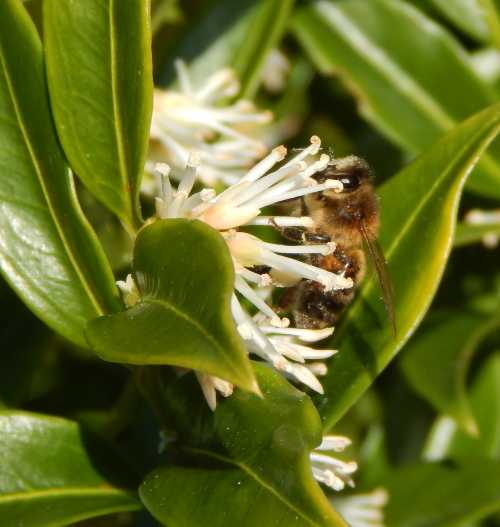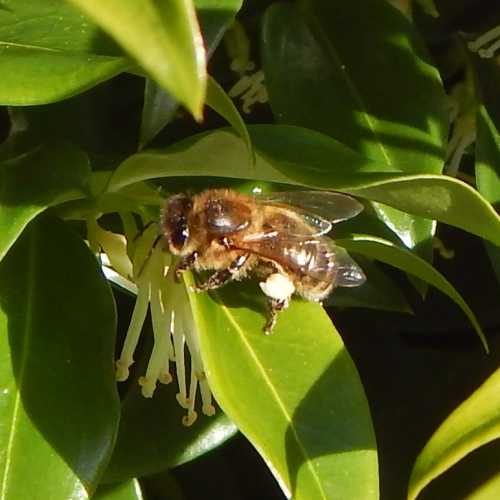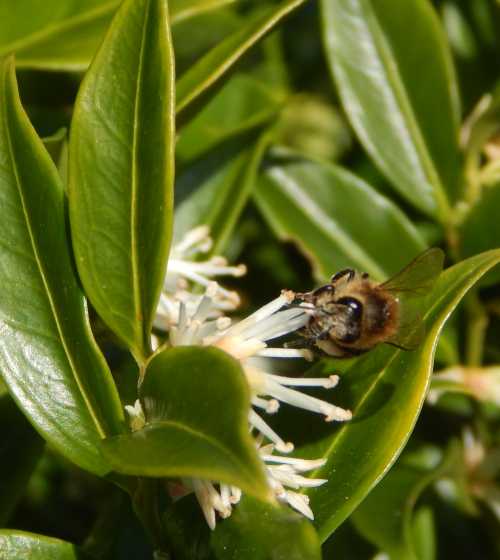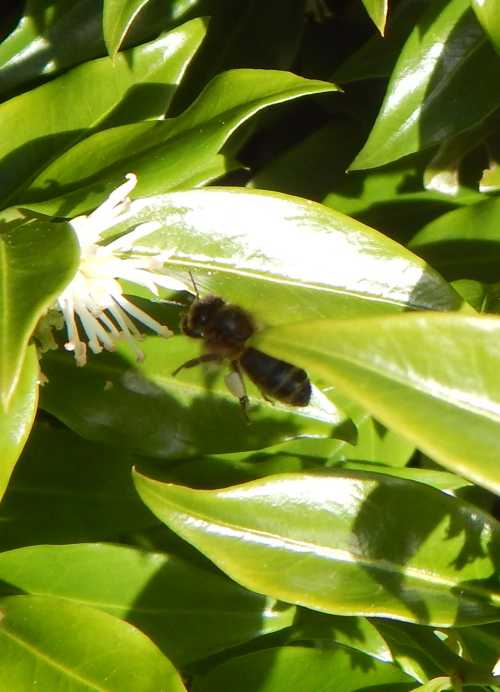Bees Love Sweet Box - Sarcococca confusa and Sarcococca hookeriana
Updated: 1st may 2021
Contrary to common misconception, honey bees will forage in cold weather, as long as there are suitable flowering plants, shrubs and trees available and the cool temperature is not accompanied by rain, snow, hail or similarly inclement weather. They might be joined by newly emerging bumble bee queens.
Bees love Sweet Box - Sarcococca confusa and Sarcococca hookeriana. These beautifully fragrant, winter flowering shrubs provide food for bees during the chilly months of January and February. If you are a beekeeper, this is a good choice for the garden. Plant it along with Daphne, winter flowering heathers (Ericas), Mahonia, and of course other important early-flowering bulbs and corms, to help the colony top up with food.
Growing Sweet Box - Sarcococca For Bees
Like Daphne - another of my favourite winter flowering bushes for bees, Sweet Box is the kind of shrub that gives off a perfume that is enticing to humans and bees alike, and as with Daphne, you can often catch the fragrance before you locate the shrub. Despite its fragrance, the flowers are relatively inconspicuous, but the bees know when they are onto a good thing, and on a cold but sunny winter day you may hear these flowering shrubs buzzing with lots of busy bees.
 Bees Love Sweet Box - Sarcococca confusa - this fragrant winter flowering shrub provides food for bees in winter.
Bees Love Sweet Box - Sarcococca confusa - this fragrant winter flowering shrub provides food for bees in winter.
In appearance, the flowers of Sarcococca are a delicate, creamy white. The pollen is a similar shade of white, as you may see from the loaded pollen baskets on the hind legs of visiting honey bees. Some varieties have anthers that are tinged with crimson pink.
 Honey bee on Sarcococca confusa showing pollen baskets loaded with creamy-white pollen.
Honey bee on Sarcococca confusa showing pollen baskets loaded with creamy-white pollen. Sweet box is a good choice of shrub for the gardens of beekeepers, providing food during the cold months of January and February.
Sweet box is a good choice of shrub for the gardens of beekeepers, providing food during the cold months of January and February.The creamy white flowers are followed by berries of a dark reddish to purple-black. It's an evergreen shrub, and the leaves are glossy with a leathery texture, a bit like those on a small Camellia bush.
Sweet Box (sometimes called 'Christmas Box') is one of those shrubs that is not only a blessing to the bees, but also to those with a gap in a moderately shady border, where it should thrive quite nicely. Ideally, you'll plant it in a spot where you too can benefit from the lovely sweet fragrance.
 Honey bee flying toward Sweet Box flower.
Honey bee flying toward Sweet Box flower.Height wise, this shrub will grow to about 1 metre. It is slow growing, but ultimately will spread out to between 1 or 2 metres. It's low maintenance too, being relatively free both from disease and from attack by plant-eating invertebrates. It only requires light pruning in spring to maintain shape.
More articles about shrubs for bees
- Ceanothus - A Wonderful Flowering Shrub For Bees Ceanothus - A Wonderful Flowering Shrub For Bees: the beautiful blue flowers provide spring food for bees.
- Which Roses Do Bees Like? Which Roses Do Bees Like? Bees typically like the beautiful open flowers of wild roses and rosa rugosa (commonly called beach rose)
- Bumblebees Love Escallonia Bumble bees Love Escallonia
- Buddleia For Bees And Butterflies Commonly known as the 'butterfly bush', buddleia (or buddleja) are also popular shrubs with bees as well as butterflies. Moths also visit this hardy bush.
- Why Bees Like Hypericum - St John's Wort Bees Like Hypericum. It provides a rich source of pollen when colonies are growing. It can be comical to watch bees land on varieties with long stamens.
If you found this page helpful or interesting, I'd really be grateful if you would share it with others - if not this page, perhaps another, such as Gardening For Bees.
Thank you so much :) .